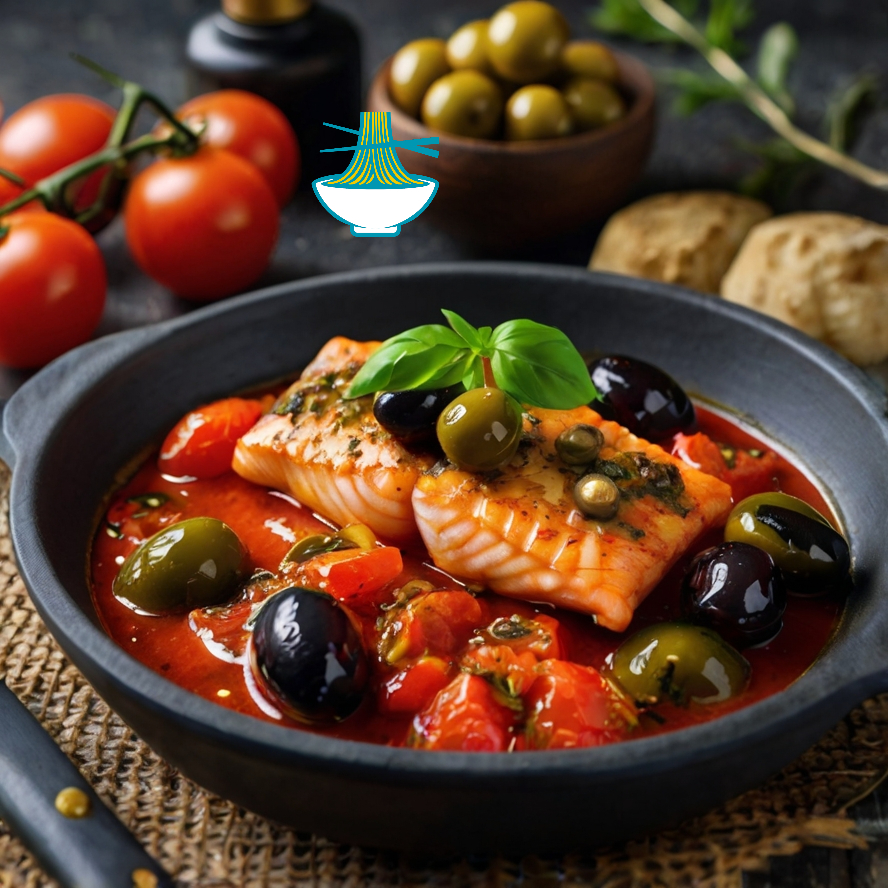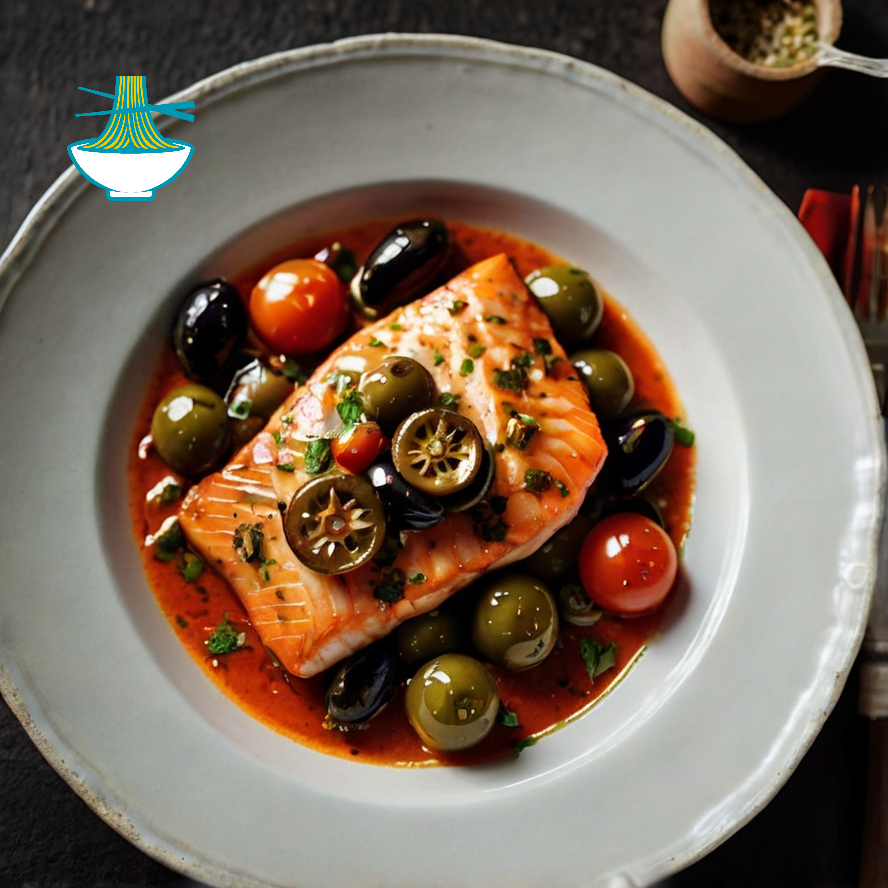Kabkabou is a flavorful North African dish featuring fish cooked with a spicy blend of tomatoes, olives, and capers. This recipe reflects the diverse culinary influences of the region, combining indigenous ingredients with flavors introduced through centuries of trade and migration. Traditionally, Kabkabou is prepared by simmering fish in a rich sauce made from ripe tomatoes, briny olives, and tangy capers, creating a harmonious balance of savory and tangy flavors. This dish is not only delicious but also a cultural symbol, representing the culinary heritage of North Africa and the Mediterranean. Its origins can be traced back to the coastal regions of countries like Tunisia, Algeria, and Morocco, where fresh seafood and aromatic spices are abundant. Over time, Kabkabou has evolved into a beloved staple in both home kitchens and restaurants, celebrated for its bold flavors and comforting appeal. Whether served with crusty bread or couscous, Kabkabou offers a taste of the vibrant and diverse culinary traditions of the Maghreb.
Ingredients:
- 4 fish fillets (such as cod, tilapia, or snapper)
- 2 tablespoons olive oil
- 1 onion, diced
- 2 cloves garlic, minced
- 1 can (14 oz) diced tomatoes
- 1/4 cup green olives, sliced
- 2 tablespoons capers
- 1 teaspoon paprika
- 1/2 teaspoon cayenne pepper (adjust to taste)
- Salt and pepper to taste
- Fresh parsley for garnish
Instructions:
1. Season fish fillets with salt and pepper.
2. In a large skillet, heat olive oil over medium heat. Add diced onions and garlic, sauté until softened.
3. Stir in diced tomatoes, sliced olives, capers, paprika, and cayenne pepper. Cook for 5 minutes, allowing flavors to meld.
4. Nestle seasoned fish fillets into the tomato mixture in the skillet.
5. Cover and simmer for 8-10 minutes, or until fish is cooked through and flakes easily with a fork.
6. Garnish with fresh parsley and serve hot.
Enjoy your flavorful Kabkabou fish dish!
Nutrition Value:
1. Fish Fillets (Cod, Tilapia, or Snapper):
- Calories: Approximately 100-150 per fillet (varies based on type and size)
- Carbohydrates: Negligible
- Protein: Approximately 20-25 grams per fillet
- Fat: Varies, typically 2-5 grams per fillet
- Sodium: Varies, typically 40-100 mg per fillet
- Cholesterol: Varies, typically 20-50 mg per fillet
- Nutritional Benefit: Excellent source of high-quality protein, omega-3 fatty acids, vitamins (B12, D), and minerals (selenium, phosphorus).
2. Olive Oil:
- Calories: Approximately 120 per tablespoon
- Carbohydrates: Negligible
- Protein: Negligible
- Fat: Approximately 14 grams per tablespoon (mostly monounsaturated)
- Sodium: Negligible
- Cholesterol: Negligible
- Nutritional Benefit: Provides healthy monounsaturated fats, antioxidants, and vitamin E.
3. Onion:
- Calories: Approximately 40 per medium onion
- Carbohydrates: Approximately 10 grams per medium onion
- Protein: Approximately 1 gram per medium onion
- Fat: Negligible
- Sodium: Negligible
- Cholesterol: Negligible
- Nutritional Benefit: Good source of dietary fiber, vitamin C, and various antioxidants.
4. Garlic:
- Calories: Approximately 5 per clove
- Carbohydrates: Approximately 1 gram per clove
- Protein: Negligible
- Fat: Negligible
- Sodium: Negligible
- Cholesterol: Negligible
- Nutritional Benefit: Contains allicin, which has anti-inflammatory and immune-boosting properties.
5. Canned Diced Tomatoes:
- Calories: Approximately 30 per half-cup serving
- Carbohydrates: Approximately 7 grams per half-cup serving
- Protein: Approximately 1 gram per half-cup serving
- Fat: Negligible
- Sodium: Approximately 200-300 mg per half-cup serving
- Cholesterol: Negligible
- Nutritional Benefit: Rich in lycopene, vitamin C, and other antioxidants.
6. Green Olives:
- Calories: Approximately 5 per olive
- Carbohydrates: Negligible
- Protein: Negligible
- Fat: Approximately 0.5 grams per olive
- Sodium: Varies, typically 30-50 mg per olive
- Cholesterol: Negligible
- Nutritional Benefit: Contains monounsaturated fats and antioxidants.
7. Capers:
- Calories: Approximately 2 per tablespoon
- Carbohydrates: Approximately 0.5 grams per tablespoon
- Protein: Negligible
- Fat: Negligible
- Sodium: Approximately 200-300 mg per tablespoon (varies based on preparation)
- Cholesterol: Negligible
- Nutritional Benefit: Good source of antioxidants and may aid digestion.
8. Paprika:
- Calories: Approximately 6 per tablespoon
- Carbohydrates: Approximately 1 gram per tablespoon
- Protein: Approximately 0.3 grams per tablespoon
- Fat: Negligible
- Sodium: Negligible
- Cholesterol: Negligible
- Nutritional Benefit: Contains capsaicin, which may have anti-inflammatory properties.
9. Cayenne Pepper:
- Calories: Approximately 6 per teaspoon
- Carbohydrates: Approximately 1 gram per teaspoon
- Protein: Approximately 0.3 grams per teaspoon
- Fat: Negligible
- Sodium: Negligible
- Cholesterol: Negligible
- Nutritional Benefit: Contains capsaicin, which may boost metabolism and reduce appetite.
10. Salt and Pepper:
- Calories: Negligible
- Carbohydrates: Negligible
- Protein: Negligible
- Fat: Negligible
- Sodium: Varies based on amount added
- Cholesterol: Negligible
- Nutritional Benefit: Enhances flavor, but excessive sodium intake should be monitored for those with high blood pressure or other health concerns.
11. Fresh Parsley:
- Calories: Approximately 1 per tablespoon
- Carbohydrates: Approximately 0.1 gram per tablespoon
- Protein: Negligible
- Fat: Negligible
- Sodium: Negligible
- Cholesterol: Negligible
- Nutritional Benefit: Good source of vitamin K, vitamin C, and antioxidants.
These values are approximate and can vary based on factors like preparation methods and specific brands of ingredients.


Comments